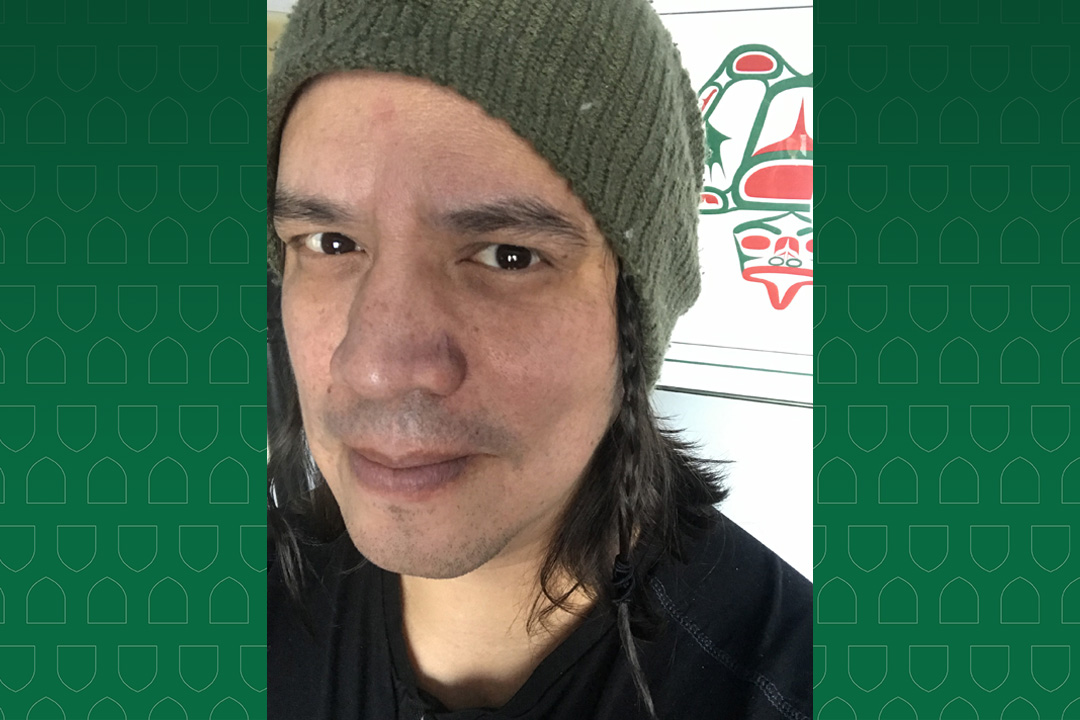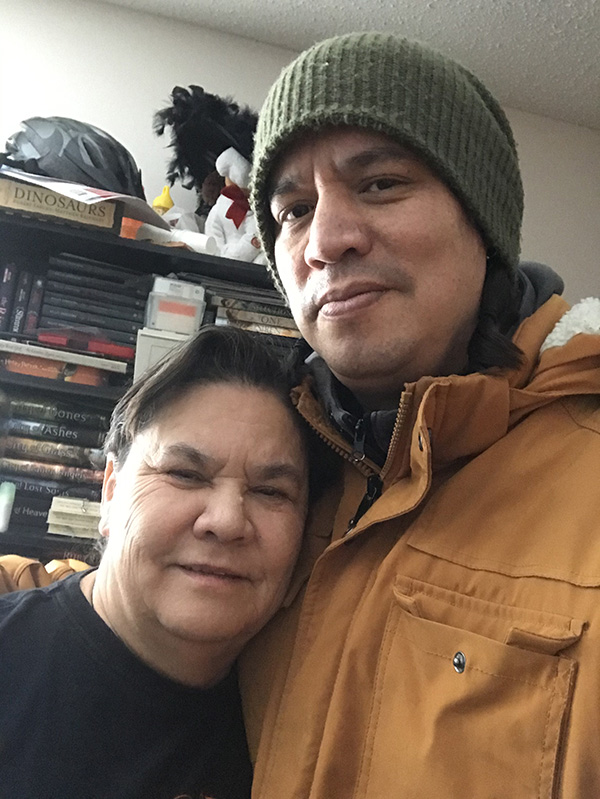
Inspired by travels, a mature student answers the call from anthropology and aspires to be a role model for all
As an Indigenous person, and through his life experience, Devin Kyle has discovered cultural connections and ways we are more similar than different.
By Kim FontaineKyle, a third-year anthropology student, has demonstrated a capacity for academic success. He is a mature student at the University of Saskatchewan (USask) who has been navigating parenthood during the pandemic, while balancing his life and studies. Kyle has been described by his professors as a pleasant and thoughtful student who enjoys initiating discussions with his questions and comments.
“By acquiring an education, I hope to also be a role model for not only my children but also others,” Kyle stated.
His values and authentic connections to his culture are an important grounding for his academic and personal success.
Kyle is being recognized with a resiliency award at this year’s Indigenous Student Achievement Awards, to be held virtually on Feb. 4, 2021. The awards honour Indigenous students studying at USask, in recognition of their academic excellence, leadership, research, community engagement and resiliency.
The award ceremony is part of Indigenous Achievement Week (IAW), which celebrates the successes and contributions of Métis, First Nations and Inuit students, staff and faculty at USask, within the context of this year’s theme: nīkānihk itohtētān, walking together into the future. IAW also offers a series of online events and workshops that everyone is welcome to participate in.
We asked Kyle a few questions about his USask journey and what lead him to anthropology.
Why did you choose anthropology?
I chose anthropology because of its relationship to human culture. While in my late 20s and early 30s, I left home to work and travel in the southern United States, which led me to be able to experience foreign cultures between Florida, The Bahamas and Jamaica. Working as a personal chef on private yachts also allowed me to experience Caribbean culture daily through market interactions while provisioning the boat with local produce and perishables. The divide I witnessed between the wealthy elite and the impoverished local population provided me with a perspective on how the wealthy experience leisure upon the exploitation of an impoverished nation of people.
My experience living in Taiwan, as well as experiencing other parts of Asia, also allowed me to understand aspects of Asian epistemologies, which changed my perspective on how and why certain people maintain cultural loyalty inside a foreign environment. Being Indigenous, I found aspects of most cultures relatable regarding kinship ties and expectations through maturity. My perspective as I grew has become aligned with the concept of how we are more similar than we are different. Reflecting on these experiences led me to believe that anthropology chose me more than I chose anthropology.
What has helped you stay motivated and committed to your studies?
I would have to say my imagination. I had spent close to three decades in the culinary industry, and although I have been fortunate to be able to utilize its many avenues of transience, I was never fully satisfied with its potential. I would never change my experience for anything. However, getting an education and finding something that provided a more interesting focal point or purpose had always sat in the back of my mind. Once the pandemic had hit, I felt that I was at a point in university where I could no longer turn back.
There were moments where I questioned my decisions as adapting to situations out of my control were at times too much, the thought of having to return to where I was not happy became the opposite to my goal of obtaining my degree. In a way, it has cleared a path by eradicating any available option of going back to the service industry as it relies on social consumption and COVID has come close to killing the industry that was the main source of my livelihood. Along with being able to focus more on my educational goals, I have been able to involve myself in personal art and expression projects that I had dreamed and talked about for many years.

Has someone in your life inspired you to get to where you are today?
My mother Audrey Dreaver. She sacrificed a lot for us children to raise and take care of us growing up. She is a woman of strength and determination and always made sure that we had what we needed without much help. By the time that we had all left the nest, she enrolled into the Indian Art Institute of America in Santa Fe, NM, and followed her dream by immersing herself in her passion for art eventually achieving her Master of Fine Art and becoming a lecturer and program co-ordinator for the Fine Arts program at First Nations University of Canada.
I had many reservations about entering university at my age for reasons that I can only label as fear. Fear of what, I do not know. What I do know is that she is a much happier person for it. Our paths are different, and I owe any wisdom I may possess to her and her lessons growing up. I still seek her guidance when I feel that I am at a point where I cannot find a reason to trudge on, be it as a parent or as a mature student. To know that she patiently waited for us to grow before embarking on her own journey and achieving what she has so far, inspired me to get an education that she always wanted us to have.
What are your goals for the future?
My goals are to have a voice and to make a difference. Being Indigenous in Saskatchewan has not gone without facing many prejudicial obstacles. I have always been proud of my heritage and roots and I want my boys to grow up with the same self-respect and understanding of their bloodline connection to this place. To teach them the importance of identity and the respect of others. I want to contribute to cultural preservation and be a part of addressing issues that will bridge the gap between the relationship of Indigenous and non-Indigenous cultures of our community, province and nation. By getting educated and utilizing my experience within the realm of other cultures, I hope to be able to find the connectivity of cultural similarities making relationships more obtainable and desirable.
This year's Indigenous Achievement Week theme is nikanihk itohtetan, walking together into the future. What does this mean to you?
To me this is the foundation of my decision to get an education. We are a nation of many cultures and religious beliefs and to achieve unity, we all need to contribute by walking together into the future.
Tell us anything about yourself that you would like us to share.
I am very passionate about music and large bodies of water.

